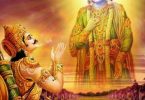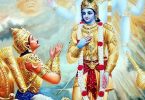Question: Is there a difference between Bhakti and Saranagati?
Answer by Romapada Swami: Bhakti is devotion, or service in devotion. Saranagati is the act of submission and surrender.
Question2 : I see lot of parallels between Vibhesan and Vidura but in the Srimad Bhagavatam purport of Srila Prabhupada it is mentioned that Vidura was not sufficiently freed from sin (Srimad Bhagavatam-3.1.17) due to his association with Duryodhana and Dhitarastra, hence he went in pilgrimage to purify instead of directly going to Lord Sri Krishna, who was physically present at that time. Were as Vibhesan had bad association as well, but he immediately took shelter of Lord Sri Rama. I am not very clear with this, could you please help me to understand the difference of Vibhesan’s and Vidura’s surrender or bhakti and also mainly why Srila Prabhupada said Vidura should be freed from sin, were in the case of Vibhesan that was not the case. If we read Srila Bhativinod thakur’s Saranagati songs, most of them are surrendering by accepting the inabilities and faults within to the Lord and begging for His mercy.
Answer by Romapada Swami:
Your question is clear. If we remember who Vidura is, ie. Yamaraja himself, one of the 12 principal mahajanas or authorities honored within the Vedas, we can know for certain that Vidura was directly inspired by Krishna from within to do as he did, and to feel as he felt (namely, he felt unqualified to go directly to Krishna, instead needing to purify himself first. Most important to the devotee is being somehow an instrument unto the Lord’s wishes; the plan of the Lord was for him to hear from Maitreya, achieve perfection, and return to deliver his unholy brother.
The plan of the Lord is not evident merely from cause-and-effect evaluation.
See Srimad Bhagavatam 1.17.22 purport: “The conclusion is, therefore, that the sufferings of the representative of religion and the representative of the earth, as present before Maharaja Pariksit, were planned to prove that Maharaja Pariksit was the ideal executive head because he knew well how to give protection to the cows (the earth) and the brahmanas (religious principles), the two pillars of spiritual advancement. Everyone is under the full control of the Lord.”
Events in the lives of exalted devotees are under the direction of the Lord; they do not follow linear patterns.
Vibhisan, conversely, was mixed in his devotion to Ram. He also had his own interest when defecting from Ravan’s side, as was spoken by Laxman and acknowledged by Ram when he came to be part of Ram’s army.






